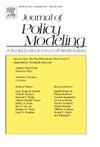US trade conflict: Potential economic implications for the US and the global economy
IF 3.1
2区 经济学
Q1 ECONOMICS
引用次数: 0
Abstract
This paper evaluates the economic consequences of increasing US trade unilateralism through a CGE modeling approach focusing on three counterfactual scenarios: universal tariff retaliation, partial US-China de-escalation, and trade barriers combined with immigration restrictions. Using a GTAP framework with enhanced labor market detail, we find that full retaliation reduces US real GDP by 1.32 % and income by 2.77 %, with particularly severe impacts on export-oriented sectors. While selected bilateral accommodation provides modest relief, the combination of trade restrictions and labor deportation policies amplifies losses, reducing GDP by 3.83 % and income by 12.08 %. The results highlight the substantial costs of retreating from cooperative trade frameworks and the interconnections between trade and immigration policies. These findings suggest that preserving rules-based cooperation, enhancing multilateral institutions, and developing integrated labor-trade adjustment mechanisms are vital for maintaining economic resilience in an evolving global order. Keywords: trade policy, tariffs, CGE modeling, labor markets, economic integration
美国贸易冲突:对美国和全球经济的潜在影响
本文通过CGE模型方法评估了美国贸易单边主义加剧的经济后果,重点关注三种反事实情景:普遍的关税报复、美中关系的部分降级以及贸易壁垒与移民限制相结合。使用GTAP框架,增强劳动力市场细节,我们发现全面报复使美国实际GDP减少1.32%,收入减少2.77%,对出口导向型部门的影响尤为严重。虽然有选择的双边妥协提供了适度的缓解,但贸易限制和劳工驱逐政策的结合放大了损失,使GDP减少了3.83%,收入减少了12.08%。研究结果凸显了退出合作贸易框架的巨大成本,以及贸易与移民政策之间的相互联系。这些发现表明,在不断变化的全球秩序中,维护基于规则的合作、加强多边机构和发展综合劳动贸易调整机制对于保持经济弹性至关重要。关键词:贸易政策,关税,CGE模型,劳动力市场,经济一体化
本文章由计算机程序翻译,如有差异,请以英文原文为准。
求助全文
约1分钟内获得全文
求助全文
来源期刊

Journal of Policy Modeling
ECONOMICS-
CiteScore
6.20
自引率
11.40%
发文量
76
期刊介绍:
The Journal of Policy Modeling is published by Elsevier for the Society for Policy Modeling to provide a forum for analysis and debate concerning international policy issues. The journal addresses questions of critical import to the world community as a whole, and it focuses upon the economic, social, and political interdependencies between national and regional systems. This implies concern with international policies for the promotion of a better life for all human beings and, therefore, concentrates on improved methodological underpinnings for dealing with these problems.
 求助内容:
求助内容: 应助结果提醒方式:
应助结果提醒方式:


